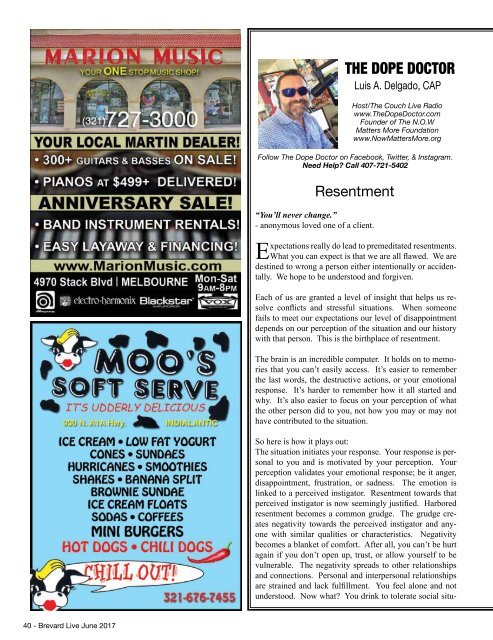Create successful ePaper yourself
Turn your PDF publications into a flip-book with our unique Google optimized e-Paper software.
THE DOPE DOCTOR<br />
Luis A. Delgado, CAP<br />
Host/The Couch Live Radio<br />
www.TheDopeDoctor.com<br />
Founder of The N.O.W<br />
Matters More Foundation<br />
www.NowMattersMore.org<br />
Follow The Dope Doctor on Facebook, Twitter, & Instagram.<br />
Need Help? Call 407-721-5402<br />
Resentment<br />
“You’ll never change.”<br />
- anonymous loved one of a client.<br />
Expectations really do lead to premeditated resentments.<br />
What you can expect is that we are all flawed. We are<br />
destined to wrong a person either intentionally or accidentally.<br />
We hope to be understood and forgiven.<br />
Each of us are granted a level of insight that helps us resolve<br />
conflicts and stressful situations. When someone<br />
fails to meet our expectations our level of disappointment<br />
depends on our perception of the situation and our history<br />
with that person. This is the birthplace of resentment.<br />
The brain is an incredible computer. It holds on to memories<br />
that you can’t easily access. It’s easier to remember<br />
the last words, the destructive actions, or your emotional<br />
response. It’s harder to remember how it all started and<br />
why. It’s also easier to focus on your perception of what<br />
the other person did to you, not how you may or may not<br />
have contributed to the situation.<br />
So here is how it plays out:<br />
The situation initiates your response. Your response is personal<br />
to you and is motivated by your perception. Your<br />
perception validates your emotional response; be it anger,<br />
disappointment, frustration, or sadness. The emotion is<br />
linked to a perceived instigator. Resentment towards that<br />
perceived instigator is now seemingly justified. Harbored<br />
resentment becomes a common grudge. The grudge creates<br />
negativity towards the perceived instigator and anyone<br />
with similar qualities or characteristics. Negativity<br />
becomes a blanket of comfort. After all, you can’t be hurt<br />
again if you don’t open up, trust, or allow yourself to be<br />
vulnerable. The negativity spreads to other relationships<br />
and connections. Personal and interpersonal relationships<br />
are strained and lack fulfillment. You feel alone and not<br />
understood. Now what? You drink to tolerate social situ-<br />
40 - Brevard Live June 2017


















